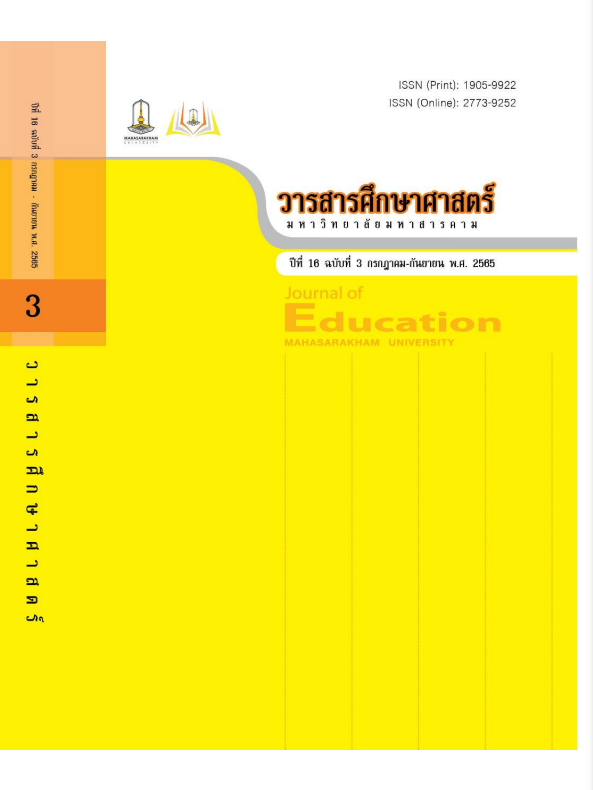A Development of Curriculum to Enhance Active Citizenship Competencies Based on Critical Pedagogy Concept for Pre-service Teacher
Main Article Content
Abstract
This research aimd to 1) develop curriculum to enhance active citizenship competencies based on critical pedagogy for pre-service teacher and 2) study efficiency of curriculum to enhance active citizenship competencies based on critical pedagogy for pre-service teacher. Research and Development (R&D) was used as methodology which was divided into two stages, 1) curriculum development and 2) curriculum evaluation. The target population is 16 third-year pre-service teachers majoring in Social Studies, School of Education, Phayao University. The researcher conducted and analyzed qualitative data. The research instruments are focus group discussion for pre-service teachers, focus group discussion for experts, semi-structured interview and unstructured data collection form.
The research findings are 1) curriculum component consists of introduction and background of curriculum, principles of curriculum, objectives of curriculum, competencies of curriculum, content of curriculum, earning activities, and measurement and evaluation. The curriculum also defines elements of active citizenship competency which are (1) respect to rights, freedom, and diversity (2) social responsibility (3) equity and equality participation and (4) social justice orientation. 2)The curriculum has encouraged the students to perform the competencies in terms of respect to rights, freedom, diversity, equity, and equality. By the way, it is highly important to raise the competencies in social responsibility and social justice orientation for the pre-service teachers.
Downloads
Article Details

This work is licensed under a Creative Commons Attribution-NonCommercial-NoDerivatives 4.0 International License.
References
กระทรวงศึกษาธิการ. (2564). Competency-based Education หลักสูตรฐานสมรรถนะ. สืบค้น 10 ธันวาคม 2564, จาก https://cbethailand.com/หลักสูตร-2/กรอบหลักสูตร/สมรรถนะหลัก-6-ประการ/สมรรถนะการเป็นพลเมือง/.
ชนิตา รักษ์พลเมือง. (2554). กระบวนทัศน์พัฒนศึกษา. กรุงเทพฯ: วิญญูชน.
ชาย โพธิสิตา. (2559). ศาสตร์และศิลป์แห่งการวิจัยเชิงคุณภาพ. กรุงเทพฯ: อมรินทร์พริ้นติ้งแอนด์พับลิชชิ่ง จำกัด.
ประกาศกระทรวงศึกษาธิการ เรื่อง มาตรฐานการอุดมศึกษา พ.ศ. 2561. (2561, 17 สิงหาคม). ราชกิจจานุเบกษา, เล่ม 135 ตอนพิเศษ 199. 19-21.
เปาโล เฟรรี. (2560). การศึกษาของผู้ถูกกดขี่ ฉบับครบรอบ 50 ปี. กรุงเทพฯ: สวนเงินมีมา.
รุ่งทิวา จันทน์วัฒนวงษ์. (2564). การเสริมสร้างความเป็นพลเมืองใส่ใจสังคมด้วยหลักการทรงงานบูรณาการกับกระบวนการคิดเชิงออกแบบที่เน้นชุมชนเป็นฐาน สำาหรับเยาวชนในศตวรรษที่ 21. วารสารศึกษาศาสตร์ มหาวิทยาลัยมหาสารคาม, 15(4), 262-280.
วสันต์ สรรพสุข นงเยาว์ เนาวรัตน์ และวิภาวี ศิริลักษณ์. (2564). หลักสูตรท้องถิ่น “คนเชียงของ” กับการขยายพรมแดนความเป็นพลเมืองในพื้นที่ชายแดน. วารสารสังคมศาสตร์วิชาการ, 14(1), 49-69.
Apple, M. (2004). Ideology and curriculum. New York: Routledge.
Dirkx, J.M. & Prenger, S.M. (1997). A guide for planning and implementing instruction for adults. A theme-based approach. Jossey-Bass Higher and Adult Education Series. San Francisco: Jossey-Bass Inc.
Freire, P. (1970). Pedagogy of the oppressed. New York: Continuum.
Hunkins, F.P. & Ornstein, A.C. (2016). Curriculum: Foundations, principles, and issues. Essex: Pearson Education.
McLaren, P. (1998). Life in schools: introduction to critical pedagogy in the foundations of education (3th ed.). New York: Longman.
McLaren, P. & Farahmandpur, R. (1999). Critical multiculturalism and the globalization of capital: Some implications for a politics of resistance. Journal of Curriculum Thorizing, 15(4), 27-46.
National Union of Students (NUS) and GuildHE. (2017). Active citizenship: The role of higher education. Retrieved December 16, 2021, from https://guildhe.ac.uk/wp-content/uploads/2016/11/ 6710-Guild-HE-Active-Citizenship-Report-44pp.pdf.
Soares, F. & Lopes, A. (2020). Active citizenship skills and active digital citizenship skills in teaching and learning in the digital age. Retrieved December 16, 2021, from https://repositorio-aberto.up.pt/bitstream/10216/133948/2/468661.pdf.
Taylor, P. (2003). How to design a training course. A&C Black.
Westheimer, J. & Kahne, J. (2004). What kind of citizen? The politics of educating for democracy. American Educational Research Journal, 41(2), 237-269.
Yarwood, R. (2014). Citizenship. London: Routledge.


